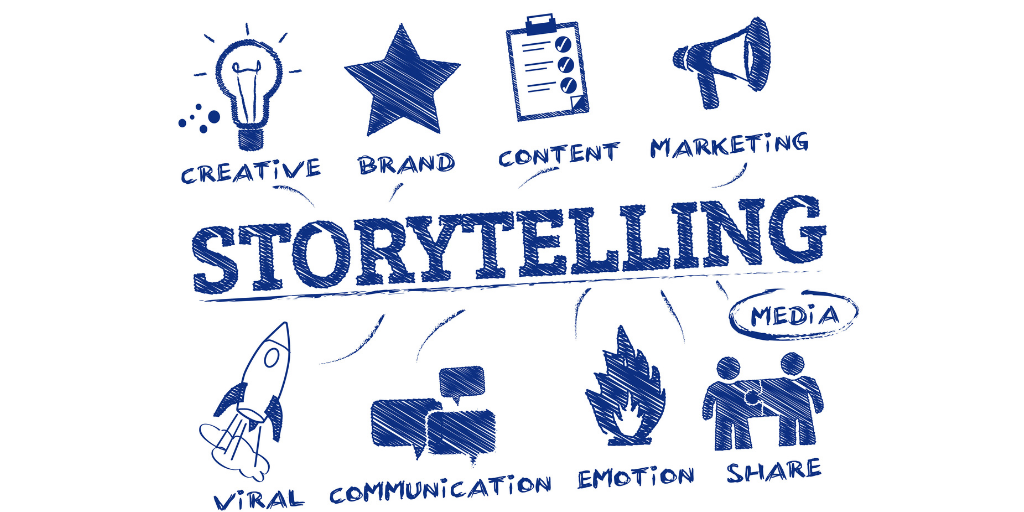
The Power of Storytelling in Business – Part 1: How to Use Stories for Small Businesses
We tend to think of stories in terms of entertainment, but they serve us well beyond that. In fact, the power of storytelling in business is one of the most overlooked aspects of brand success. In this article, we’ll look at why you should use storytelling in your business interactions, plus some tips on how to do it.
Stories have been an essential part of human life since the beginning of time. Before paper existed, they were used as fireside entertainment and to pass along important parts of history to younger generations.
After paper, they were used as entertainment in the form of novels and children’s books. Once TV came around, they were used to create shows and movies.
But throughout all of time, stories have always been used as a primary method of communication.
And that’s why the power of storytelling in business is so crucial.
By using stories in B2B communications, companies can enhance client loyalty, increase profits, and create a robust marketing strategy.
If you’re like most small businesses, you aren’t implementing this strategy, and quite frankly, you’re shooting yourself in the foot.
Let’s dig in and look at why storytelling is powerful in business operations, as well as the best mechanisms to implement it and put it into practice.
Why You Should Use Storytelling in Your B2B Interactions
To have an effective brand, you need to be clear in how you represent your company to the world. The best way to do this is through storytelling. It tells the world why you exist, what you do, who the characters in the story are, and where you’re going in the future.
Stories are the ideal way to build a brand because they are memorable and provide an easy way to understand what a company is all about and why someone would want to be a part of it (buy their products or services).
An effective brand invites people into the brand story so that they feel like they are part of it. But it does much more than that. Let’s break it down…
You’ll Build a Better Brand
The power of storytelling in business really shines when it comes to branding. The fact is when you have a story behind your brand, you’ll build a better brand.
A brand story makes your brand clear and easily understandable. But, more importantly, it sparks interest and makes your brand memorable.
A story brings a human element to a brand. The person can view themselves in the story, so they become part of it. Rather than looking at a company from the outside, they begin to identify with it, which gives the brand a much deeper meaning.
You’ll Gain a Competitive Advantage
Most small businesses don’t take the time to use storytelling, even though all of the most successful companies know it’s one of their most effective strategies. That means that when you do implement the power of storytelling in business, you’ll have an instant competitive advantage.
But more than that, you need to understand that buying decisions aren’t logical. In most cases, they’re emotional, and much of the power of storytelling in business comes from the fact that a story taps into the emotions.
You can sell the same thing as someone else, but if you use storytelling, you can make much more than everyone else.
For instance, researchers tested out this theory by auctioning off insignificant items in an eBay auction. They purchased thrift store items for about $1.25 a piece and then used heartfelt short stories in the product descriptions.
The outcome was incredibly telling… and surprising. They were able to sell the items for almost $8000 cumulatively.
You’re Marketing Will Be More Effective
Storytelling makes a marketing message more powerful because of how effective it is at evoking emotions and increasing brand relatability. Plus, it makes concepts easier to understand.
Watch this Budweiser advert or this Mercedes-Benz commercial, for example. Notice how they pull on your emotions and make you connect to the brands in a much stronger way.
It Makes Your Company More Likeable
Let’s face it, people love a great story, so if you have a good one, you’re going to win points for being more likeable right off the bat. Plus, you can demonstrate your beliefs and values through your stories, which will increase your likability even further.
It Drives Action
One of the biggest reasons behind the power of storytelling in business is that stories create action. Your audience will be able to connect with your story and have an emotional reaction to it. From there, they’ll feel motivated to take action.
Wharton Business School, for example, conducted a study involving a donation collection drive in a call center. They found that when the participants were told about how the money would enhance other people's lives, they donated twice as much.
How to Use the Power of Storytelling in Business
Now that we’ve looked at just how powerful the power of storytelling in business is, let’s move on to learning how to go about it. Developing a story can be as simple as a three-step process…
1. Determine Your Conflict
To tell a good story, there needs to be a conflict that the main character has to overcome. If you haven’t already created a customer avatar, start there because you’ll need to fully understand your customer to create a conflict that they will identify with.
The conflict is basically their biggest pain point. Without offending your audience, bring their problem to the forefront in your story.
2. Establish Your Climax
Once you have your conflict, you’ll create the climax of your story, which is the solution you are offering. Your brand now takes center stage because you have a way to solve their problem, but you’re not the hero.
The hero is always the prospect, customer or a room full of business partners. It’s their story you’re telling, and it’s their transformation, not yours. Your role is that of a guide. You’re guiding the hero to their transformation.
3. Describe the Transformation
This is where you explain how different things are for the main character now that they’ve found the solution to their problem. Essentially, you’re going to tell them how their lives will change when they purchase the solution you’re offering.

Techniques to Help You Create an Exceptional Story
Creating a story that your customers will relate to isn’t easy. A lot of thought and data needs to go into it. But, if you answer the following 3 questions, it’ll help you with this process.
What Problem Does Your Product or Service Solve?
Before you can write a compelling story and tap into the power of storytelling in business, you need to understand why your customers buy from you, or why they buy from your competitors.
What is the problem you are solving? And keep in mind it might have more to do with emotion than anything else. A good example of an emotion-based solution is Apple. What they are selling is status first, then their computers and phones.
What Feeling Are You Trying to Bring Up?
Now that you know that feeling often sells before the product itself, you need to dig down deep and come up with the feelings that your product elicits.
Airbnb sells the feeling of possibility in this video. Nike is selling the feeling of motivation in this video. When De Beers ran their “A diamond is forever” campaign, they were selling the feeling of eternal love.
What feeling are you selling? What emotion do you want your customers to feel when they buy your products or services?
Would Your Employees Buy Your Products or Services?
Do your employees love what you’re selling? If they do, you’ll have an army of brand ambassadors out there selling for you. They’ll be excited about telling the world about what you’re offering.
If they don’t, why?
Okay, we get it; maybe you’re selling a piece of software that businesses would need, but not your employees. Putting things like that aside, if your employees aren’t loving what you’re putting out, then you need to do what you can to improve it.
Put out a confidential survey asking your employees for their honest opinions. Often, the best solutions will come from them, as well as great story ideas.
Final Thoughts about the Power of Storytelling in Business
Using the power of storytelling in business is an advanced marketing strategy that delivers phenomenal results, when it’s done right. The emotional connections you can create through stories pave the way for a more engaged audience and a stronger excitement about your brand.
Once you have your story, use it everywhere: in business meetings, on consult calls, on social media, in your marketing collateral and ads, on your website, etc.
Intrigued by this concept, but don’t know where to begin? We’re here to make it easy-peasy. Just contact us for a free consult!

